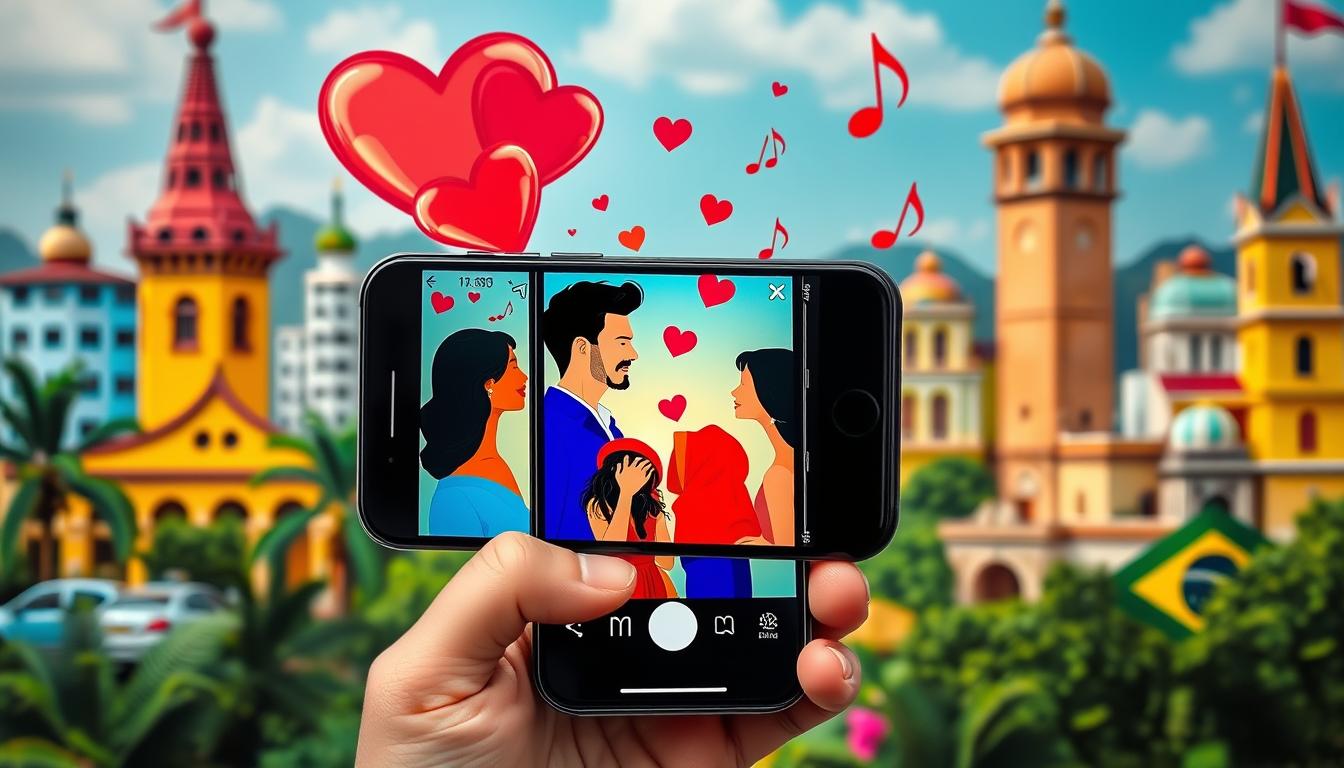Manter um relacionamento intercultural pode parecer um desafio emocionante e complexo, não acha? Diferenças culturais em relacionamentos, barreiras linguísticas e a necessidade de flexibilidade são apenas algumas questões que exigem atenção especial. Então, como navegar por este mar cultural com sucesso? Neste artigo, vamos explorar dicas valiosas, desde compreender e aceitar as diferenças culturais até fortalecer a comunicação entre casais. Preparado para descobrir como manter o amor saudável, mesmo à distância? Vamos lá! 😄
Como lidar com diferenças culturais em relacionamentos?
No relacionamento intercultural, as diferenças culturais podem ser tanto um presente como um desafio. Agora, imagine lidar com isso diariamente, hein? Entender culturas diferentes é um passo crucial! Por que entender culturas diferentes é importante? Porque compreender e aceitar essas diferenças é o que vai manter a relação saudável. Isso evita muitos mal-entendidos e cria uma base de respeito mútuo.
Anúncios
Estratégias para superar preconceitos em relacionamento são super necessárias. Muitas vezes, sem perceber, podemos estar reproduzindo estereótipos que prejudicam o convívio. A lógica aqui é simples: é importante sempre conversar e esclarecer esses pontos. Pense que cada comentário ou ação feita sem pensar pode machucar o parceiro de outra cultura. Então, que tal começar cada dia com uma pequena lição sobre a cultura do seu parceiro? Além de interessante, pode ser muito útil!
A empatia cultural em casais interculturais é importante. Mas o que seria empatia cultural? É basicamente colocar-se no lugar do outro, conhecer suas tradições, valores e até as datas festivas que são significativas. Por exemplo, se o seu parceiro celebra o Dia de Ação de Graças, mesmo que não faça parte da sua tradição, é legal se interessar e até participar. Dessa forma, vocês criam um espaço de respeito e união.
E aí, quer saber mais? Visite o EF International Language Campuses. Eles oferecem uma infinidade de recursos para ajudar você a navegar por essas águas interculturais com facilidade. Lembrar que o amor vence barreiras, incluindo as culturais. Então, bora quebrar esses limites e aproveitar cada aprendizado que as diferenças culturais em relacionamentos podem proporcionar!
Quais são as barreiras linguísticas comuns e como superá-las?
Ah, as barreiras linguísticas! Se relacionar com alguém de outra cultura já é um desafio, e quando as línguas são diferentes, é como adicionar uma camada de molho picante ao taco. Pode ser delicioso, mas também pode queimar um pouco. Agora, experimente algumas dicas para superar essas barreiras com habilidade e até um sorriso no rosto. 🥳
Primeiro, as ferramentas de tradução são seus novos melhores amigos. Aplicativos como Google Translate ou EF Careers podem ajudar a entender aquelas palavras mais complicadas que surgem do nada. No entanto, lembre-se de que esses ajudantes digitais não captam todas as nuances. Usá-los em conjunto com dicionários ou guias de conversação torna tudo muito mais eficaz.
Mas, e quando a comunicação verbal não é o suficiente? Linguagem corporal expressiva e gestos valem ouro. Nem sempre é 100% preciso, mas humor e paciência frequentemente tapam esses buracos. Crie momentos diários de aprendizado e experiência! Que tal assistir juntos a um filme em inglês, trocar mensagens ou declarar amor em um novo idioma? Assim, você não só melhora sua compreensão, mas também transforma o aprendizado em algo divertido e significativo.
Histórias inspiradoras? Tenho algumas na manga! Conheci um casal onde ele era brasileiro e ela, francesa. No início, era uma dança de palavras desajeitada. Com paciência e dicas como essas, eles estão hoje felizes e fluentes um no idioma do outro. Então, compreenda que, com determinação e o desejo de se entender, as palavras passam a dançar graciosamente quando você menos espera. 🍀
Qual a importância da flexibilidade e paciência em um relacionamento intercultural?
Flexibilidade e paciência são como o arroz e feijão dos relacionamentos interculturais, essenciais para um prato culturalmente diverso e saboroso. Mas qual é a importância real desses dois ingredientes?
Flexibilidade é crucial porque permite que você se ajuste a novas expectativas e costumes culturais. Imagine que seu parceiro vem de um lugar onde o jantar é geralmente às 22h. Parece estranho, né? Com um toque de flexibilidade, você transforma isso em uma oportunidade para experimentar novos horários e talvez, descobrir que comer mais tarde tem seus encantos. Aprender a se adaptar culturalmente é um superpoder que fortalece o namoro.
Paciência, por outro lado, é sua melhor amiga quando os desafios e conflitos culturais aparecem. Seja esperando que seu parceiro entenda uma piada local ou aceitando o tempo que ele leva para adaptar-se ao seu jeito de celebrar as festividades, a paciência ajuda a manter a calma. Ela é útil para lidar com aqueles momentos em que vocês falam idiomas diferentes – literalmente ou figurativamente.
Os benefícios da flexibilidade e paciência vão além de evitar brigas. Eles realmente cimentam a fundação do respeito mútuo e crescimento emocional. Cada vez que você se adapta ou entende, está colocando um tijolinho na construção de um vínculo mais forte.
Então, se você está num relacionamento intercultural: abra sua mente, experimente a comida esquisita, aprenda a dança estranha. Use flexibilidade e paciência como suas armas secretas. Lembra do ditado, né? Quem tem paciência e flexibilidade entende melhor a sua metade do outro lado do mundo!
Como manter um relacionamento à distância saudável?
Manter um relacionamento à distância pode parecer uma tarefa hercúlea. A pergunta inevitável é: como é possível manter o amor e a conexão quando há quilômetros, talvez oceanos, entre vocês? A resposta mais prática vem na forma de estratégias eficazes e bem pensadas. Seguir uma rotina que funcione para ambos é crucial. Crie horários para falar ou videochamar, respeitando sempre as diferenças de fuso horário. Assim, essa estratégia ajuda a criar uma sensação de estabilidade.
Comunicação é outro ponto forte, e a comunicação digital é o seu melhor aliado. Não bastam conversas esporádicas, mas sim interações consistentes e significativas por diversos meios: mensagens, chamadas de vídeo e até pequenas surpresas digitais. O segredo é fazer disso uma prioridade no seu dia a dia, como um lembrete constante do seu compromisso.
E claro, a confiança. Como manter um relacionamento à distância sem ela? É importante discutir expectativas e estabelecer limites claros. A transparência se torna uma forma de demonstrar compromisso e respeito mútuo, essencial para que a confiança floresça sem desconfianças.
E lembre-se: equilibrar independência com interdependência faz parte do pacote. Ambos devem ser capazes de crescer individualmente enquanto alimentam o relacionamento. A chave para resolver isso é sempre comunicar sentimentos ou preocupações antes que se tornem grandes obstáculos.
Compartilhar experiências diárias, mesmo que simples, fortalece esse vínculo. Tire proveito de aplicativos e mídias sociais para dividir momentos em tempo real. Quem diria que as redes sociais teriam esse superpoder, hein? Seguir esses passos transforma o que pode parecer uma missão impossível em uma jornada perfeitamente viável e, melhor ainda, fortalecida pelo desafio da distância.
Como integrar tradições e celebrações culturais no dia a dia?
A integração das tradições e celebrações culturais no dia a dia de um casal multicultural pode ser um verdadeiro desafio, mas também é uma aventura cheia de aprendizagem e enriquecimento. Como podemos fazer isso de maneira eficaz?
Uma abordagem prática é planejar celebrações que respeitem ambas as culturas. Isso significa encontrar maneiras de comemorar feriados e datas importantes de ambos os lados. Por exemplo, se um parceiro celebra o Ano Novo Chinês e o outro, o Carnaval, considere ter uma pequena celebração para ambos em casa. Essa prática não só respeita as raízes culturais de cada um, como também proporciona momentos de união e diversão.
Outra dica interessante é envolver práticas culturais do parceiro no cotidiano. Isso pode ser simples, como cozinhar pratos típicos ou ouvir música tradicional de cada cultura durante a semana. A ideia é mesclar elementos culturais no dia a dia, tornando cada um mais familiar e confortável com as tradições do outro.
Ah, mas e o que fazer quando queremos criar algo único? Daí vem a magia de criar novas tradições juntos! Muitos casais multiculturais acabam criando suas próprias tradições, que são uma mistura dos costumes de ambos. Pode ser um jantar especial a cada último sábado do mês ou uma viagem anual para um local que ambos nunca visitaram. Essas novas tradições ajudam a reforçar o vínculo de maneira original e significativa.
Em suma, o mais importante é manter a mente aberta e o coração disposto a aprender e compartilhar. Essa integração cultural não só fortalece o relacionamento, mas também enriquece a vida de ambos com novas experiências. Juntos, vocês podem criar um mundo onde cada cultura é valorizada e celebrada de forma única e pessoal.
Conclusão
Lidar com diferenças culturais em relacionamentos exige compreensão, aceitação e empatia. Superar barreiras linguísticas e adaptar-se com flexibilidade e paciência são fundamentais para o sucesso desses relacionamentos. A comunicação eficaz e a confiança são pilares para manter a conexão à distância. Integrar tradições culturais enriquece a convivência e fortalece a união. Em suma, a chave está em abraçar as diferenças e transformar os desafios em oportunidades de crescimento e entendimento mútuo. Afinal, cada casal pode criar um ambiente harmonioso e enriquecedor, celebrando a diversidade cultural.
FAQ
Como entender melhor as diferenças culturais em um relacionamento?
Para entender melhor as diferenças culturais em um relacionamento, é importante se envolver com a cultura do seu parceiro. Isso mantém a relação saudável, evitando mal-entendidos e estabelecendo respeito mútuo. Conversar, aprender sobre tradições e participar delas são passos úteis para criar um espaço de união e respeito.
Quais estratégias podem ajudar a superar preconceitos em relações interculturais?
Para superar preconceitos em relações interculturais, conversar abertamente sobre estereótipos e esclarecer mal-entendidos é crucial. Começar o dia aprendendo algo novo sobre a cultura do parceiro pode ser uma maneira empolgante e educativa de fortalecer o relacionamento.
Como superar barreiras linguísticas em um relacionamento intercultural?
Superar barreiras linguísticas requer ferramentas de tradução, comunicação não verbal e humor. Linguagem corporal e gestos são úteis e criar momentos de aprendizado, como assistir filmes juntos, pode tornar a experiência de aprendizado divertida e significativa.
Por que flexibilidade e paciência são importantes em um relacionamento intercultural?
Flexibilidade e paciência são essenciais em um relacionamento intercultural porque ajudam a lidar com diferentes costumes e promover o respeito mútuo. Adaptar-se a novas experiências e compreender o tempo do parceiro para se ajustar fortalece o vínculo.
Como integrar tradições culturais de ambos parceiros no dia a dia?
Para integrar tradições culturais, planeje celebrações que respeitem ambas as culturas e envolva práticas do parceiro no cotidiano. Criar novas tradições juntos também pode solidificar o relacionamento e enriquecer a vida mútua com experiências únicas.
Conteúdo criado com Assistência de Inteligência Artificial



